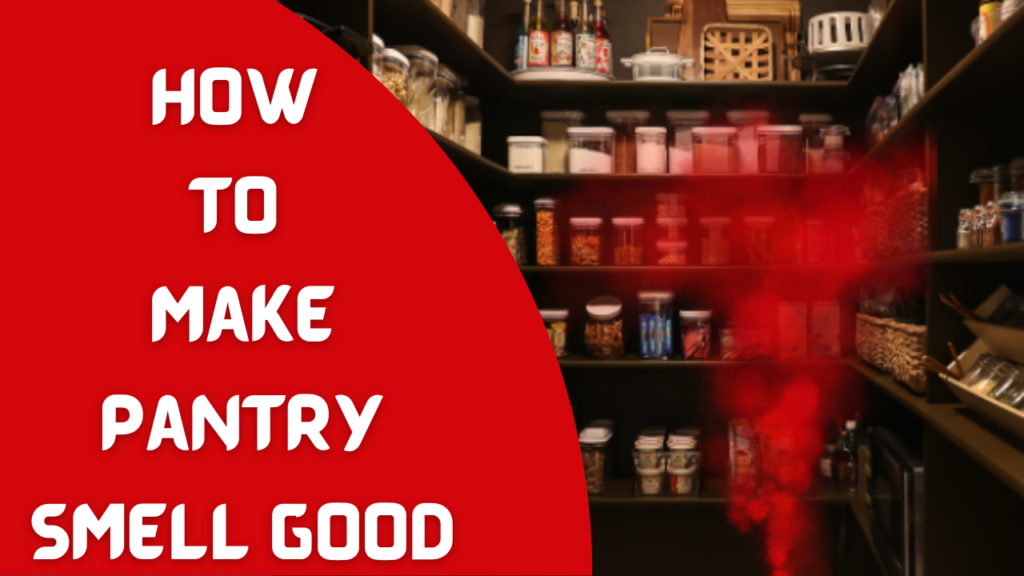The bad smell in pantry can turn your stomach every time you open the door. But it doesn’t have to be this way! With these tips, you can make your pantry smell great again.
A clean kitchen is essential to making a home feel safe and welcoming for guests, family members, and yourself. Nobody likes to face a disgusting kitchen when they open the door, so if your pantry is riddled with all sorts of smelly things, it’s time to clean it.
To make your pantry smell good, you have first to clean out the shelves and cabinets, replace old dried herbs, replace burnt-out light bulbs, and clean out and replace spice bags. Also, you must discard all bad spices and wash and dry all of your spice bottles. This way, any effort to make the pantry smell good will not be in vain.
Now that we know how easy it is to make a pantry smell good, we will look at what causes the pantry to smell bad.
Causes of smelling pantry
Do you have an ill, sour, or foul smell in your pantry? This could be unwelcoming, and you want it gone. But first, why does your pantry stink? Rotten food, pests, mold or mildew, or a dead rat behind a wall or under the floor are potential reasons for bad pantry aromas.
No matter what’s creating the stench, it’s terrible, and getting rid of it will be awful. So first, find out what it is, then deal with it. Below are the common reasons why you get a pantry smell.
Spoiled Food
The most likely cause of a stinky pantry is the food you store in it. I mean, spoilage. This is especially probable if you store fresh fruits and vegetables in your cupboard, but packaged meals and other things can rot, too.
Rotting food has a unique smell that indicates you’ve kept anything in your cupboard for too long. Start by looking through baskets, boxes, and other fresh food containers. Both are good at hiding evidence. In addition, potatoes, turnips, radishes, and other root crops can produce an odor quickly after spoiling.
You’re not safe even if you have jarred and canned food. Though hermetically sealed food is less prone to producing scents, the seal might have failed or ruptured. Inspect all canned and preserved foods first, as homemade methods are more likely to fail than factory-made.
Look for a greasy texture, leaking, burst caps, or other symptoms of spoiled food. If you observe such indicators of rotting, don’t open the container to explore; you may encounter a foul eruption you won’t soon forget. On the other hand, if all your home-preserved products are OK, check your store-bought items.
Unusual swelling, staining, or other signs may indicate rotten food and quickly proliferating germs. Please don’t open it; just throw it away.
Pest Activity
When out of control, pantry bugs can cause foul smells. Mice and rats are likely perpetrators. Their corpses and droppings can add to a nasty pantry stink, especially if they’re left there for an extended period.
Rats and mice defecate and pee anywhere they go, sit, or walk. So naturally, this causes a sour, barnyard-like stench. But you’ll also see it. Look for oily traces on pantry walls, shelves, and corners. This oily smudge represents a path the mouse or rat regularly utilizes and is a mixture of fur oils and droppings. Their droppings are dark or black and the size of a rice grain to a bean.
Insects are another concern, and the variety of kinds means you may need to inspect your pantry to find the cause. Flour, rice, dried beans, grains, and more are frequent pantry pests. In addition, weevils, beetles, ants, mites, and more might be affected. When insects enter your pantry, they will eat, reproduce, defecate, lay eggs, or be filthy on a microscopic scale.
If you scrutinize your meal, you may find discolored areas, sand-sized material, or live insects. Their eggs are little, strange groups of things. The more insect activity, the more pungent the musty, metallic, or sour stench. Some weevil species smell like old coins.
If you find an insect or mouse infestation in your pantry, you’ll need to toss out any contaminated food, kill the bugs, and then clean the pantry to remove the stink.
Mold or Mildew
This is a common cause of the odor. For example, if your pantry smells like a cellar or attic, you may have mold, mildew, or fungus. Your food is generally safe if it’s sealed or wrapped, but you’ll need to act immediately. High humidity or a neglected pantry spill might exacerbate this problem in warm conditions. Once you smell that stench, it’s time to examine it.
Remove mold or mildew using the right cleaner and a hard brush. Keep your pantry dry and well-ventilated to avoid this issue in the future.
Dead Mouse or Rat
It’s terrible. Most readers have dealt with this situation and recognize the stench. Mice are a continual nuisance in most homes as they can fit into tiny areas and scurry freely behind walls, above ceilings, and beneath floors.
Mice will use their keen sense of smell to find the pantry or other food sources. Unfortunately, mice don’t live long, and one will likely die in your pantry. The decomposition causes a strange odor that becomes sickening and repulsive, then turns awful and drives you and everyone else insane.
Unfortunately, that stench will most likely last at least two weeks. Most people can’t stand this, especially in a pantry with limited airflow. After that, you’ll have to find the source of the scent, cut up the wall or floor, and remove the mouse’s carcass.

Here are some tips for making your pantry smell good.
Clean out the shelves and cabinets.
Take everything out of your pantry and clean every shelf and cabinet with a mild soap solution and a scrub brush. If you have hard-to-reach corners, use an old toothbrush or a small scrub brush to clean the back corners. If there are any lingering odors in your pantry from decaying food or stale spices, clean them away using baking soda and white vinegar solutions.
Replace old dried herbs.
Ensure that all your herbs are fresh before putting anything back into the pantry. There are a few tell-tale signs of an old dried herb, so if you see a browning leaf or shriveled-up bunch of basil, toss it. If there is any smell from the cabinet where you keep your dried herbs, wipe the inside with vinegar and water.
Replace any burnt-out light bulbs in lighting fixtures inside your pantry.
Replace the covers on non-glossy painted surfaces surrounding food items in the pantry. The old non-glossy paint on your pantry can peel and chip off, so replace it before the food gets on it and smells up the rest of the house.
Clean out and replace the bags that you use to store spices.
If you don’t get them out right away, they will start to mold and mildew. Also, don’t buy cheap bags for storing spices. You’ll save money but have to deal with a funky smell in your pantry once they get half-rotted away.
Discard all spices that are going bad or start to crack up inside their packaging.
Dried herbs and spices have a limited shelf life, so you might as well get rid of them before they get stale.
Wash and dry all of your spice bottles.
If you have older, hard-to-find bottles for storing spices, wash them out with soap and water before replacing them in the pantry. Clean out your spice rack or cabinet to make room for new containers. Replace all old spices with fresh ones when they get old or start to smell funny.
With these tips on how to make your pantry smell good, you’ll be able to keep your pantry smelling fresh and clean without having a horrid kitchen when guests come over.
How to cool down a pantry
So you just discovered that your overheating pantry was causing all of your foods to spoil or go bad, and now you want to know how to cool down a pantry. It can be difficult because the temperature in the pantry is often uneven, but there are many ways to tackle the issue.
Some ways of cooling down a pantry include:
- If you have an air conditioner at home, lower its thermostat setting and use it to cool off your entire house.
- Use an icebox to hold cooler items, and check the temperature inside it throughout the day to see if it’s too hot or too cold.
- Smaller items you might store in a refrigerator: Items like cheese, eggs, and meat should keep very well in a refrigerator.
- If you have one that’s not full of heavy food items, use it for your canned foods.
- Make sure everything is tightly closed.
- Make sure the door locks are open frequently so that air can circulate inside.
- If you leave something out for a long time, make sure to clean out the pantry.
- The hot air rising from your food will increase the temperature in your pantry.
- Use fans to circulate the air!
- As a last resort, open windows, doors, and fans to get cool air.
If you’re having trouble cooling down your pantry, call a professional. They can assess the situation and implement an effective solution for you.
Conclusion
There are different ways how to make pantry smell good, but first, you have to eliminate the causes. As we have mentioned, there are reasons why the pantry smells bad which have to be sorted out first. Also, the more stuffy your pantry is the more chances it will smell bad. Follow the above steps to cool down the pantry by letting fresh air in and other remedies. Hopefully, this will help your pantry smell good.

